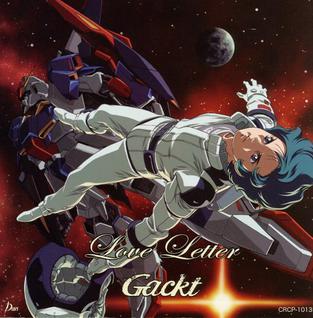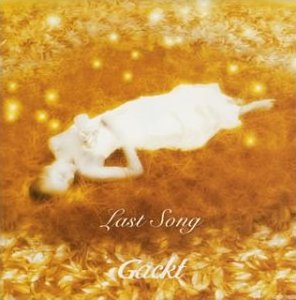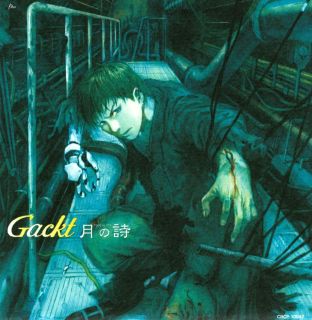
Mars is the first full-length studio album released by Japanese solo artist Gackt. It was released on April 26, 2000.

The Sixth Day: Single Collection is a compilation album released by Gackt on February 25, 2004. The album collects the artist's previous single's title songs, some of them having been re-recorded for this release. The Sixth Day complements The Seventh Night, an unplugged album released three months later.

The Seventh Night: Unplugged is a compilation album released by Gackt on May 26, 2004. It contains acoustic arrangements of previously released songs and complements The Sixth Day, a single collection released three months earlier. The unplugged theme of The Seventh Night would be continued by Gackt's subsequent album, Love Letter.

Moon is the third full-length studio album released by Japanese solo artist Gackt on June 19, 2002. Instead of a booklet, the album comes with a printed note by the artist, asking readers to "sense" the record's story, rather than analyzing the lyrics. The booklet was eventually included in the packaging of Moon's 2003 follow-up Crescent. Both albums are conceptually linked, as well as his more recent albums Diabolos and Last Moon from the "Moon Saga".

Crescent is the fourth full-length studio album released by Japanese solo artist Gackt on December 3, 2003. It is conceptually linked to its predecessor Moon and comes with booklets for both records. Crescent also features a duet with L'Arc-en-Ciel vocalist Hyde for "Orenji no Taiyou" with whom Gackt co-starred in the 2003 movie Moon Child.

Love Letter is the fifth full-length studio album originally released by Japanese solo artist Gackt on February 14, 2005 in Japan.

"Redemption" is a single released by Japanese musician Gackt on January 25, 2006. Its songs "Redemption" and "Longing" were theme songs of the video game Dirge of Cerberus: Final Fantasy VII.

The discography of Japanese R&B singer Misia consists of nine studio albums, three compilation albums, one extended play (EP), one live album, six remix albums, twenty-six singles, twelve promotional singles, eighteen video albums and thirty-seven music videos. In 1997, Misia signed a recording contract with BMG Japan and joined the then up-and-coming talent agency, Rhythmedia. Under the sub-label Arista Japan, Misia released her first single, "Tsutsumikomu Yō ni..." in February 1998, followed by "Hi no Ataru Basho" in May. In June, her debut album, Mother Father Brother Sister, opened at number three on the Oricon chart. The album peaked at number one three weeks later and stayed in the top five for eleven consecutive weeks. Mother Father Brother Sister was certified double million and won a Japan Record Award for Best Album, as well as a Japan Gold Disc Award for Pop Album of the Year. In 2000, Misia's second studio album, Love Is the Message, debuted at number one and was certified double million. It won a Japan Record Award for Best Album and a Japan Gold Disc Award for Pop Album of the Year. The album spawned three top ten hits: "Believe," "Wasurenai Hibi" and "Sweetness." Misia's first remix album, Misia Remix 2000 Little Tokyo, was released three months later and shot to number one. It sold over 800,000 copies and is the second best-selling remix album of all time in Japan.

"Metamorphoze" is a single released by Gackt on May 25, 2005 under Nippon Crown.

"Todokanai Ai to Shitteita no ni Osaekirezu ni Aishitsuzuketa..." is a single released by Gackt on August 10, 2005 under Nippon Crown.

"Love Letter" is a single released by Gackt on March 1, 2006 under Nippon Crown. It peaked at ninth place on the Oricon weekly chart and charted for seven weeks. The A-side and B-side were used in the Mobile Suit Zeta Gundam movie Love is the Pulse of the Stars, as opening and ending themes, respectively. "Dybbuk" also previously appeared on Gackt's 2003 album Crescent. It was certified gold by RIAJ.

"Last Song" is a single released by Gackt on November 12, 2003 under Nippon Crown. It peaked at fifth place on the Oricon weekly chart and charted for 13 weeks. It was certified gold by RIAJ. An unplugged piano-only version was recorded, and music video filmed, for The Seventh Night: Unplugged.

"Kimi ga Oikaketa Yume" (君が追いかけた夢) is a single released by Gackt on March 19, 2003 under Nippon Crown. It peaked at second place on the Oricon weekly chart and charted for ten weeks. It was certified gold by RIAJ.

"Black Stone" is a single released by Gackt on April 27, 2005 under Nippon Crown. It peaked at third place on the Oricon weekly chart and charted for seven weeks. It was certified gold by RIAJ.
The discography of Japanese singer Mai Kuraki consists of fifteen studio albums, six compilation albums, twenty-three video albums, three remix albums, fifty-six singles, and sixteen promotional singles. Kuraki debuted in 1999, while she was still in high school, through Giza Studio. The label initially marketed Kuraki in the United States under the name Mai K, and released the single "Baby I Like" (1999). However, the single was a commercial failure which prompted the label to send her back to Japan. There, they released her single "Love, Day After Tomorrow", which peaked at number two on the Oricon Singles Chart and was certified million by the Recording Industry Association of Japan (RIAJ). The second single, "Stay by My Side" became her first number one single on the chart. Kuraki's debut album, Delicious Way, topped the Oricon Albums Chart and was certified triple million by the RIAJ.
The discography of Ayaka consists of six studio albums, two compilation albums, a cover album and numerous singles, released through Warner between 2006 and 2009, and through Ayaka's independent label, A Station, from 2012 onwards.

"Tsuki no Uta" (月の詩) is a single released by Gackt on June 11, 2003 under Nippon Crown. It peaked at third place on the Oricon weekly chart and charted for seven weeks. The song "Tsuki no Uta" was used as the first ending theme for anime Texhnolyze. It was certified gold by RIAJ.

"Kimi ni Aitakute" (君に逢いたくて) is a single released by Gackt on October 27, 2004 under Nippon Crown. It peaked at second place on the Oricon Singles Chart and charted for seventeen weeks. In 2004, it was the 96th best selling single of the year, with sales of 98,335 copies. It ultimately sold 124,280 copies, making it Gackt's ninth best selling single. It was certified gold by RIAJ.
The discography of Japanese group KinKi Kids consists of 16 studio albums, 6 compilation albums, 25 video albums and 44 singles. All of KinKi Kids' singles have reached number one in Japan on Oricon charts. All of their music has been released by Johnny's Entertainment in Japan. In Taiwan, Kinki Kids' music has been released under Forward Music from 1997 to 2000, Skyhigh Entertainment and What's Music in 2001, and Avex Taiwan from 2002 to the present.
Japanese singer and songwriter Miliyah Kato has released eleven studio albums, six compilation albums, two EPs, one remix album, one cover album, one tribute album, 51 singles, and 15 promotional singles. She has sold over 9 million records in Japan, making her one of the best-selling and most-downloaded artist in the country of all time. Kato has been named as "the charisma of the high school girls" and "the queen of the unrequited love songs" by several media.















